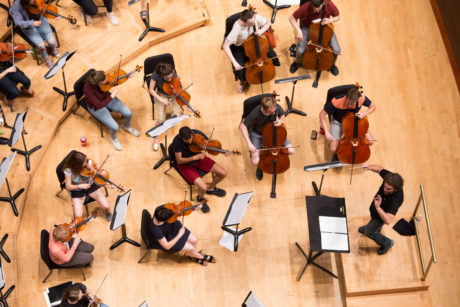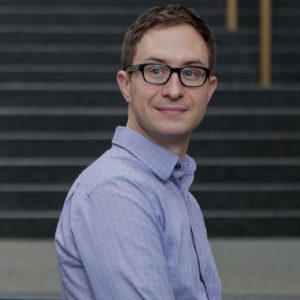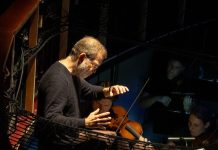When the National Orchestral Institute and Festival (NOI+F) began in 1987, its first director appealed to student musicians across the country by telling them that “participants will have the opportunity to study great orchestral literature with internationally renowned conductors… and with distinguished musicians of some of America’s foremost orchestras, and faculty from the University of Maryland Department of Music.” Thirty years later, that description might as well be printed on audition materials sent out to students today. The basic elemental components of the festival have remained from that first edition, but they have also been expanded and augmented by other goals.
Today, the festival – a month-long program for young orchestral musicians – is directed by Richard Scerbo, who is a constant source of enthusiasm and innovation. I sat down with him to discuss the 30th anniversary, the things that make NOI+F so special, and a major honor he has recently received.
Robert Lintott: Congratulations on 30 years of NOI+F! What is the festival doing to celebrate?
Richard Scerbo: As part of our 30th anniversary season, we are partnering with a number of exciting organizations, including Wolf Trap Opera, with whom we partnered for our opening pops concert, and our Mahler 4 concert this weekend.
Another exciting partnership is with the Havana Lyceum Orchestra (HLO) and Simone Dinnerstein as piano soloist. The musicians of the HLO are the same age as the students at NOI, but they have never been to the United States before (many of them have never been out of Cuba before). They’re traveling here as part of a tour of the East Coast, but what’s unique about their stop at NOI is that they’ll be working alongside American musicians who are of the same age and in the same place in their musical career. So, on June 28, they’ll perform the first half of the concert as the HLO with Carlos Fariña’s Punto y Tonadas and Mozart’s Piano Concerto No. 23. For the second half of the concert, they’ll join the NOI Philharmonic for Tchaikovsky’s Romeo and Juliet overture and Arturo Márquez’s Danzon No. 2.
One of the other partnerships that NOI+F has is with Naxos records. Can you tell us a bit about that?
Yeah! About four years ago now, a NOI Philharmonic performance of Beethoven’s Fifth Symphony conducted by James Ross was heard by a very well-respected music critic. And that critic wrote to the CEO of Naxos and said the orchestra sounds great, you should really look into it! That started this conversation with Naxos that resulted in a nationally unique partnership in which we would record one concert every year featuring works by American composers, and then that concert would be released on an album as part of their American Classics series.
It’s an incredible partnership, and I’m so grateful that we’re now in our third year. David Alan Miller was here this year to conduct our Naxos performance, which included Carl Ruggles’ Sun-Treader, Steven Stucky’s Second Concerto for Orchestra, and John Harbison’s Fourth Symphony. It was great to have David back, as he helped us to inaugurate this relationship in 2015 with our first recording. This year’s performance will be coming out next June, but the first two albums are available now.
For me, this is exactly something an orchestra of the future should be doing. We’re performing modern American works, and we’re giving these young musicians onstage the opportunity to go through a professional recording session and concert-recording experience, and then they have an album to their credit that they will take with them as a professional calling card to help launch their career.
You were recently named as one of thirty Musical America’s 2016 Innovators, largely as a result of your work with NOI+F and Inscape, the chamber orchestra you oversee. What are you doing that’s innovating the orchestral experience?
I like to think of the work that I do with NOI and Inscape as addressing some of the fundamental issues that I see musicians needing to tackle. One is being accessible and being advocates for their art form. And that is something that is very important for me with NOI. With my work with Inscape, it is presenting and performing programs that are interesting and diverse. Female composers, emerging composers, new works paired with old works, looking to find tension between new and old.
It was an honor, and incredibly humbling, to be selected for that list. But the work that we’re doing with NOl, especially that around audience-building, is so essential. It’s just not being done frequently enough to break down this barrier between audience and orchestra. I’m hoping that our work at the festival will make a difference.

You mention audience-building and engagement a lot when I talk to you, and that has been one of your particular emphases at NOI+F. I know you’ve had musicians going out into the community, but you’re also changing the way audiences and musicians interact at the performance venue. Tell us a bit about that.
One of the things that we launched last year, and that has continued this year has been our Spark! Lounge, which is a place for audiences to meet, mix, mingle, and also spark their curiosity and imagination about the evening’s concert. Here we have informal conversations with a host or a musician involved in that concert, and provide a welcoming and fun space pre-concert. After the concert, the musicians come out to meet with the audience, talk about the performance they just heard, and, for our last two NOI concerts (June 24 and July 1), we’ll have a jazz trio playing in the lounge.
The idea is to provide a place pre- and post-concert where audience members can meet musicians and learn about the program that they’re about to hear and to, as much as we can, bring down this invisible curtain that exists between audience and orchestra.
As the festival comes to a close, you’ve got a big finale planned for July 1. What’s in store for that evening?
The festival finale was programmed as a sort of homage to the final concert of the very first year of NOI. In 1988, the final concert of NOI had David Zinman conducting an all-Tchaikovsky program. That concert included the Rococo Variations with Ron Leonard as the soloist. At the time, Leonard was the principal cellist of the Los Angeles Philharmonic. This year as the finale of our 30th anniversary season, we are performing Tchaikovsky’s Fifth Symphony, which was on that earlier program, and we have Robert deMaine, who is the current principal cellist of the LA Phil performing Elgar’s Cello Concerto. So there are some parallels, and for those that maybe remember that first concert, there are definitely lines drawn between the two programs.
With thirty years in the books, what’s in store for the future of NOI?
Hopefully thirty more years! I think one of the things that is important for cultural organizations like NOI in the future is to engage in these relationships with others in the field and not compete, but partner. And I’m so happy with the partnerships we’ve launched with Wolf Trap, with Naxos, and even here at the University of Maryland with UMD’s Academy for Innovation and Entrepreneurship. In the future look for those partnerships to grow and blossom.
Finally, what is the best part of being the director of NOI+F?
One of the things I like to talk about the most is just how fantastic and phenomenal this orchestra sounds. These musicians inspire me every day with their hard work and dedication. We’ve been through an incredibly rigorous recording week, and now we’re onto a program that includes Mahler, Bartok, and Wagner! I know they’re tired, but they get onstage every day, they sit in rehearsals, they attend master classes and sectionals, and they do it with such poise and professionalism that it really gives me hope and enthusiasm for the future of orchestral music.
The National Orchestral Institute and Festival has multiple concerts remaining, including this weekend’s performance of Mahler’s Fourth Symphony (June 24), a free family performance of Peter and the Wolf (June 25), the joint program with the Havana Lyceum Orchestra (June 28), and the Festival Finale (July 1).
—
Robert Lintott is a doctoral candidate in musicology at the University of Maryland. His research and teaching interests include 20th and 21st century classical music as well as popular music. He has written program notes extensively in the Washington DC area including for Dawn Upshaw this Spring.






